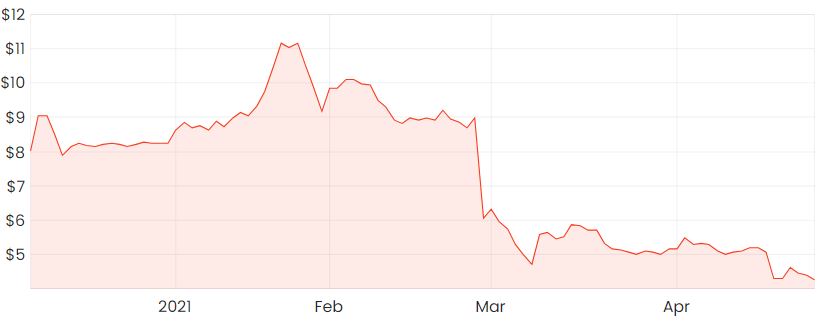The Nuix Ltd (ASX: NXL) share price has been dealt an additional 5.5% blow today, meaning the company’s market valuation has now tumbled more than 53% since releasing its H1 FY21 results which weren’t too well received by the market.
NXL share price

Why has the Nuix share price struggled?
As my colleague, Raymond Jang pointed out in his article, the timing of Nuix’s listing on the ASX late last year has been a contributing factor behind the recent fall in its lofty valuation.
2020 was a year where tech companies greatly outperformed other sectors, mainly due to favourable monetary policy and record low interest rates.
Being a software company, Nuix’s valuation was therefore listed with a similarly high valuation alongside other tech companies with record-high valuations.
The company listed with a market capitalisation of $1.8 billion, or around 9x projected revenue for FY21. When investors are willing to pay such a high multiple for a company’s shares, it implies they’re expecting high levels of growth to justify this valuation.
H1 FY21 results – growth slows
It seems investors were expecting more out of Nuix’s H1 FY21 results that could’ve supported such a valuation.
Total revenue for the half was $85.3 million, down 4% on the prior corresponding period (PCP), which represented around 44% of the company’s FY21 revenue forecast as part of its prospectus.
Foreign exchange (FX) impacts were partly to blame due to the appreciation of the Australian dollar against the USD as the company generates the majority of its revenue in the US.
Another headwind on revenue was the continual shift from on-premise software licencing model to a consumption-based model.
Revenue derived from Perpetual Licences revenue was 7% of Total Revenue in FY20, down from 13% in FY18.
Perpetual and on-premise models usually involve more revenue being recognised upfront compared to more flexible usage models, so it makes sense that this will be a short-term headwind on revenue while this transition is still occurring.
Summary
Nuix remains on my watchlist for now. Despite its shares falling steeply recently, I try not to anchor my decision too much on what it used to trade at.
Looking at other companies that have transitioned to consumption-based revenue models, I’ve noticed it can take quite some time to realise the benefits over upfront revenue models.
For some more reading, I’d suggest getting a free Rask account and accessing our full stock reports. Click this link to join for free and access our analyst reports.










